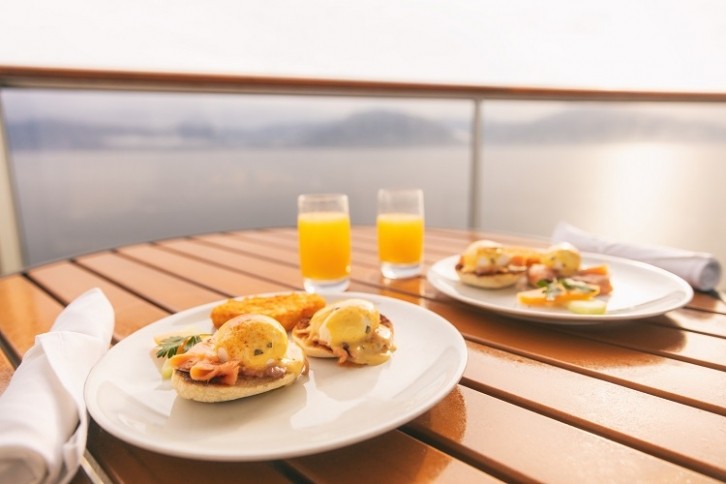The cruise business is just not precisely famed for its eco-friendly credentials. The truth is, it’s extra prone to be related to environmentally damaging behaviours, reminiscent of inflicting injury to coral reefs and influencing the migratory patterns of marine wildlife. Nonetheless, the business seems to be bettering its strategy to the atmosphere, beginning with meals waste.
How is the cruise business lowering meals waste?
There seems to be a concerted effort by the cruise business to enhance its carbon footprint and lowering meals waste is a vital a part of that effort.
A veritable big of the cruise business, Royal Caribbean, has developed a platform to observe meals provide and intently estimate precisely how a lot meals must be produced, prepped and ordered on any given day. It is also implementing synthetic intelligence (AI) to regulate meals manufacturing in actual time, monitoring visitor demand for particular menu gadgets and adjusting menu preparation and ordering accordingly, with an purpose of lowering meals waste throughout its whole fleet by 50% by 2025. It is also partnering with the World Wildlife Fund (WWF) to introduce a meals waste consciousness marketing campaign within the crew eating areas fleetwide.
However that’s not essentially the most fascinating half. Royal Caribbean can also be turning meals waste into vitality. The road’s latest ships will convert strong waste straight into vitality on board.
“Pioneering the primary waste-to-energy system on a cruise ship builds on our observe document of waste administration and furthers our dedication to take away waste from native landfills.”
The techniques, Microwave-Assisted Pyrolysis (MAP) and Micro Auto Gasification (MAG), takes waste on board and converts it into synthesis gasoline (syngas) that the ship can straight use as vitality, much like land-based waste-to-energy services.
“I’m pleased with Royal Caribbean Group’s drive to SEA the Future and be higher tomorrow than we’re at this time,” mentioned Jason Liberty, president and CEO of Royal Caribbean Group. “Pioneering the primary waste-to-energy system on a cruise ship builds on our observe document of waste administration and furthers our dedication to take away waste from native landfills.”
And Royal Caribbean is just not the one cruise line placing eco-friendly practices on the agenda. P&O Cruises can also be setting targets for lowering meals waste.
“Because of the concerted dedication of our onboard meals and beverage groups, we proudly achieved and surpassed our 2022 aim to scale back meals waste per individual by 30%,” a spokesperson for P&O Cruises instructed FoodNavigator. “We established a brand new aim of a 40% discount by 2025 and a 50% discount by 2030 relative to our 2019 baseline.”
Like Royal Caribbean, P&O Cruises can also be turning to expertise to responsibly handle the meals waste it does produce, serving to to keep away from a reliance on sending the waste to landfill at ports visited or worse, dumping the waste at sea.
“The secure administration of meals waste is a key element in our ongoing dedication to lowering our affect on the oceans we sail. A method wherein we make sure the environment friendly administration of meals waste is thru investments in expertise reminiscent of biodigesters and dehydrators,” a spokesperson for P&O Cruises defined to FoodNavigator.
Meals waste biodigester expertise makes use of a pure cardio digestion course of inside every machine to effectively break down meals waste, utilising a mixture of useful microorganisms. Biodigesters scale back the quantity of methane and carbon dioxide emitted into the environment whereas additionally lowering the demand on the ocean for full meals waste decomposition.
Working 24 hours per day, the biodigesters additionally acquire plastic and different inorganic supplies, stopping them from being discarded overboard. Meals waste dehydrators are then used to take away water content material from the meals waste, lowering its quantity by roughly 90%. Dehydrators produce a largely dry inert biomass output, which is offloaded when the ship reaches port or incinerated on board.
Princess Cruises is one other line to implement the usage of biodigesters of their meals waste.
“Meals is an enormous deal on a ship and we’re focussed on minimising any meals waste,” defined John Padgett, President of Princess Cruises. “We’re accelerating the pure organic course of with this expertise and so any of the biproduct has a decrease affect on the general ecosystem. And we’re measuring ever little bit of it as a result of we weighed it and so now we all know the general waste per visitor on a ship and we have now all sorts of initiatives that proceed to concentrate on decreasing that waste.”
Can meals producers study from the cruise business about lowering meals waste?
Although they’re arguably late to the sport in the case of eco-conscious behaviours, the cruise business is no longer solely taking the problem significantly however investing closely in applied sciences to sort out it. And people applied sciences may actually be utilized by meals producers in coping with meals waste.
The place the cruise business makes use of AI to trace visitor demand for particular menu gadgets and modify preparations accordingly, meals producers may maybe have a look at client demand by means of gross sales and produce meals merchandise accordingly, thus avoiding overproduction.
Nonetheless, in situations when meals is overproduced, the ensuing waste may doubtlessly be transformed again into vitality, utilizing techniques much like the Microwave-Assisted Pyrolysis (MAP) and Micro Auto Gasification (MAG) techniques utilized by Royal Caribbean. That vitality may then be funnelled again into future meals manufacturing.
Meals producers may additionally use biodigesters and dehydrators to scale back methane and carbon dioxide emissions when disposing of any meals waste produced. The truth is, some meals and beverage producers are already utilizing the identical or comparable applied sciences, with PepsiCo utilizing biodigesters and sure supermarkets, reminiscent of Hoogvliet within the Netherlands, utilizing AI to observe meals gross sales and drop the value of meals which are nearing their expiration date.



